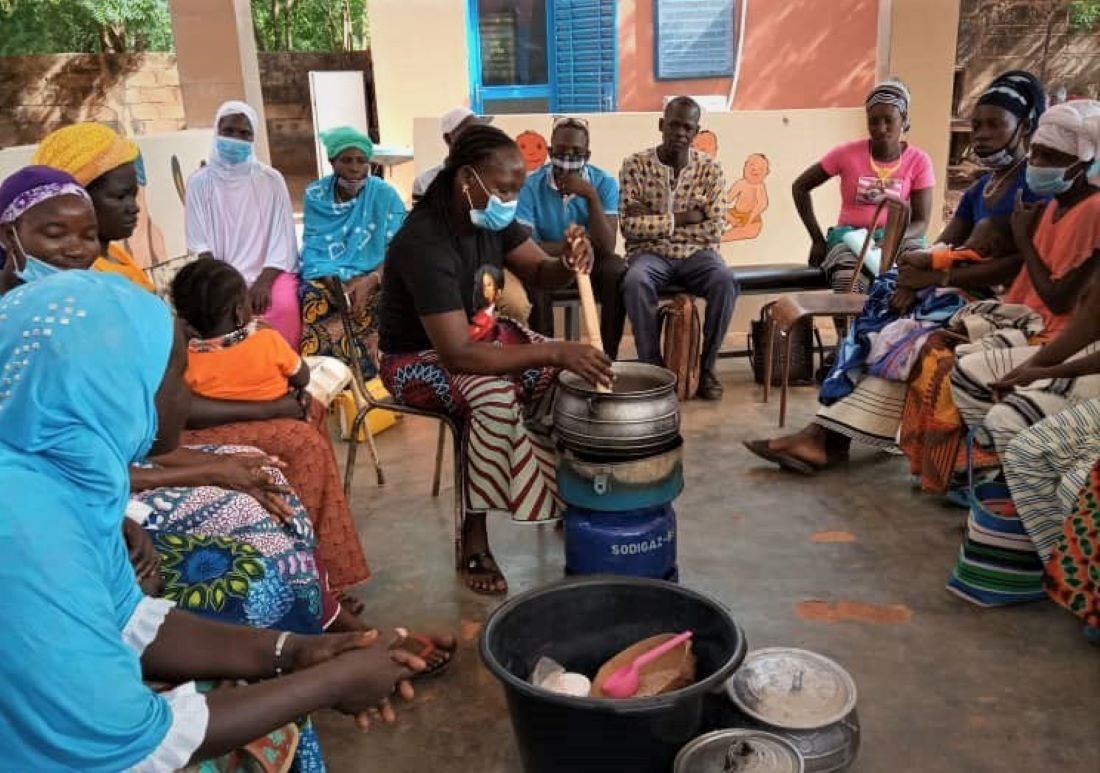
USAID Advancing Nutrition received New Partnerships Initiative (NPI) funding to provide grants and support to four organizations in Burkina Faso and Kenya working to improve maternal and child nutrition. As part of USAID’s Acquisition and Assistance Strategy, NPI was launched in 2020 to promote funding opportunities and capacity development for local leadership to define, design, and implement development solutions within their communities. Through NPI from 2020–2023, USAID Advancing Nutrition worked with grant recipients to—
- improve health and nutrition among women and children, with a focus on the 1,000-day window from pregnancy to a child’s second birthday
- strengthen their technical and organizational capacity to help them achieve their goals and become more effective partners to USAID.
New Partnerships Initiative Grantees in Kenya
Established in 2011, the Centre for Behaviour Change and Communication (CBCC) provides locally driven social and behavior change solutions using evidence-based programming, innovative approaches, and strong partnerships. As a grantee of the NPI Grants Program through USAID Advancing Nutrition, CBCC Africa is implementing a nutrition-focused social and behavior change project aimed to improve the health and nutrition of women and children in Kakamega County, Kenya. The project aims to—
- improve uptake of high impact nutrition behaviors and practices
- strengthen the capacity of health and non-health workers in the community
- strengthen coordination mechanisms at the county and sub-county levels.

The OGRA Foundation started as a youth group in 2000 and registered as a nongovernmental organization (NGO) in 2004. Their mission is to promote and improve health and emergency response in pursuing economic and cultural development in the fight against poverty and social exclusion in the communities they serve. As a sub-grantee, OGRA Foundation is implementing community- and health facility-based nutrition interventions aimed at improving the health and nutrition of women and children in Kakamega County, Kenya. The objectives of the project include—
- increasing uptake of health and nutrition services through strategies to increase demand for services
- improving availability and quality of nutritional services
- strengthening coordination mechanisms at the county and sub-county levels.
New Partnerships Initiative Grantees in Burkina Faso
SOS Sahel International Burkina Faso is an NGO established in 1982 to support rural populations in the Sahel affected by drought through sustainable development projects. SOS Sahel’s mission is to "cultivate the spirit of national and international solidarity for the benefit of the underprivileged populations in Burkina Faso." They are part of the SOS Sahel International Federation, which comprises associations stretching across the Sahel from Senegal to Ethiopia. Currently, SOS Sahel International Burkina Faso implements 16 projects in 33 of the country's 45 provinces. This represents a geographical coverage of 73.33%. All the projects cover several areas, namely nutrition, health, food security, education, gender promotion, emergency, resilience, land reclamation, local governance, etc. The project the organization is implementing through NPI seeks to reduce acute and chronic malnutrition and improve access to care for women and children in the Ziro province of the Centre-West region of Burkina Faso. Specifically, it will—
- improve access to and use of health and nutrition services by children under 5 and pregnant and lactating women
- improve adoption of health and nutrition practices through social and behavior change.

PanAfricare originated from Africare, an organization founded by Africans Americans in the 1970s during the Sahelian droughts of the 1970s to help vulnerable populations respond to food security challenges, was established to continue Africare’s mission in Africa. PanAfricare seeks to keep the promise of improving the lives and building the future of African communities with programs focusing on health, agriculture and food security, and capacity building. Thanks to the NPI partnership with USAID Advancing Nutrition, PanAfricare seeks to tackle malnutrition through community strategies in the Sanguié province of the Center-West region of Burkina Faso. The project aims to—
- build the capacities of community health workers, community nutrition resource people, and focal points on infant and young child feeding
- reduce stunting
- reduce wasting in children.
The Way Forward
In May and June 2023, we conducted end-line organizational capacity assessments with partners to assess organizational changes, take stock of learning from the program and lay out a path for continued organizational development for each organization.